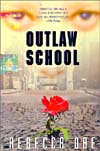
The F-word in a science fiction world
by Adrienne Martini
Feminism gets a bad rap nowadays, and for good reason. Sure, every self-respecting woman—particularly those who are employed, or who are able to choose to stay home with the kids—has her barricade-storming foremothers to thank for the opportunities she now has.
But as much as modern women (whatever that means) owe to icons such as Gloria Steinem, the first-wave definitions of feminism just don't fit anymore. A generation of girls has been raised in a post-feminist world, one in which our mothers worked, our fathers helped around the house, and we were expected to go out and get real jobs before we got married and had babies. For middle- and upper-middle-class Americans, the old models of an oppressive patriarchy just aren't there anymore—having been replaced by something still too nebulous to define—and the angry words of a generation gone-by ring hollow in the post-sexual-revolution world.
One of the great things about speculative fiction is the promise of its name—the ability to speculate, to extrapolate the present into a cohesive future. Think of 1984. While George Orwell wasn't writing specifically about what was going on in 1948, he did take some of his time's more odious aspects and project where they could lead. The chilling result could not have been achieved had Orwell limited himself to writing realistically about the society in which he was living. Creating a "future," couching 1984 in the context of novelistic fantasy, gave Orwell a safe space in which to air his scathing indictment of the current climate.
This use of speculative fiction as a safe soapbox has not gone unnoticed by female writers. The genre is full of women who write about fantastic worlds in order to talk about contemporary reality. Margaret Atwood and Ursula K. Le Guin are masters of the form; Rebecca Ore and Nancy Springer are just two of the authors trying to follow in their footsteps. But in her latest, Outlaw School (Eos/Harper Collins, $13.50), Ore fails.

It may seem unfair to invoke Atwood or Orwell when considering the work of a relative newcomer (Ore's first book came out in 1988), but Ore's work invites the comparison. Like Atwood and Orwell's most famous novels, Outlaw School projects a possible future of relations between the sexes and creates an oppressive dystopia in which those who question the system are chewed up and spit out. But 1984 and Atwood's The Handmaid's Tale had riveting premises and sympathetic heroes; Outlaw School has an unbelievable premise and a pathetic hero.
The novel is not particularly chilling, partly because the author seems to be extrapolating from a world long gone by. The dystopia of School seems rooted more in the early 1950s than the turn of the 21st century. It's difficult to imagine the world Ore has fashioned—one in which women must essentially choose between being a "Judicious Girl," a renegade, or a corpse—ever becoming a reality, unless major chunks of current society simply vanish. 1984 posited an endless world war—something very much imaginable in 1948. School seems to hint at some nastiness that befell the world as it currently stands, but never truly spells it out—or even provides clues to what happened.
This flaw, though central, could be more easily overlooked if Ore's protagonist, Jayne, were more interesting. Jayne finds herself in a dilemma of her own devising—she chooses to get pregnant in a floundering attempt to remake her life, even though she has other options—and continues to make lousy choices that only worsen her situation. Granted, Jayne's actions are plausible at the start of the book when she's a teenager, but she repeats the same self- destructive behavior as she ages, seeming to have learned nothing from it by the story's end. That may happen in real life, but it doesn't make for very engaging fiction. Pile those problems on top of Ore's distant writing style, and Outlaw School becomes a dull read.
Nancy Springer's lighthearted Plumage (William Morrow, $23) is much more entertaining, even if its world is just as improbable as Outlaw School's. Even though she grapples with the same themes as Ore—women trying to figure out where they fit with regard to men— Springer always balances her weighty themes with a light tone.

At first, Plumage feels almost weightless. The story concerns a drab, middle-aged woman inappropriately named Sassy. Sassy's husband has left her for a sweet young thing, and to make money she becomes a hotel maid. One day a parakeet poops on her head, and Sassy's life is forever changed.
Plumage, if you must categorize it, sits somewhere between magical realism and hard fantasy. Sassy does travel in a fantastic manner to a fantasy world, yet her "real" world is a bit magical in its own right—there's a woman who can communicate with parakeets, a shop entirely devoted to feathered bits of clothing, and magical mirrors that can transport the viewer to the land of the subconscious. Like Springer's previous Fair Peril and Larque on the Wing, Plumage is set in its own unique realm in which almost anything can happen.
Springer tends to get sappy, at times repetitively so, covering the same I'm-OK-you're-OK touchstones that were so popular decades ago. But while some of her sentiments are predictable, her plotting isn't. Every time you think Plumage will take the easy road, it suddenly shifts, looking for a more challenging path. And while she includes enough old-school feminism to make those strident marchers proud, Springer tempers the rhetoric with the healthy dose of skepticism that's so desperately needed in these post-feminist times. A little of that skepticism would help Ore make her work resonate in today's climate, which little resembles the one in which the first-wave feminists started out.

January 25, 2001 * Vol. 11, No. 4
© 2001 Metro Pulse
|